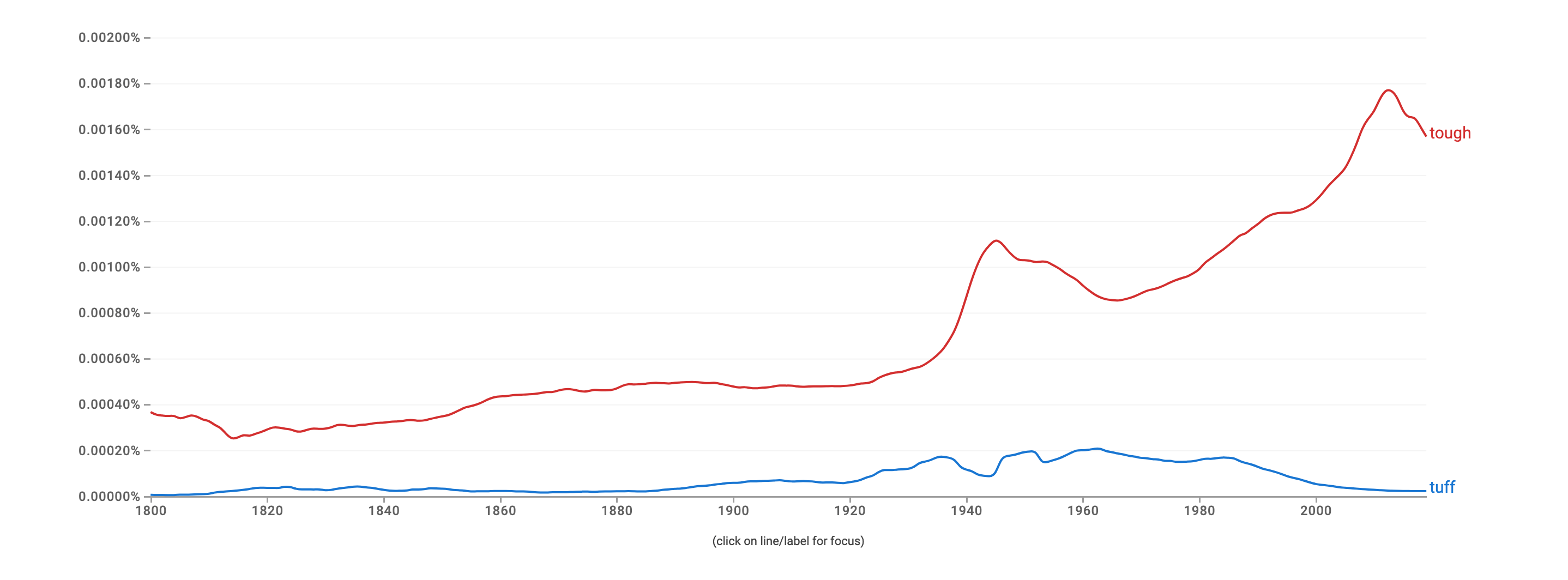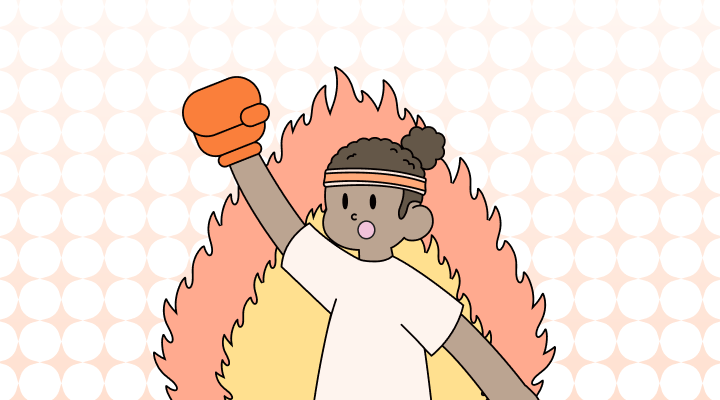- "Tuff" is a geological term used to describe a type of rock made up of compacted volcanic ash.
- "Tough" typically describes something strong, resilient, or difficult to break or endure. It can refer to physical strength, as well as mental or emotional resilience in the face of challenges.
In this sentence, "tuff" refers to a type of rock composed of compacted volcanic ash. The layer of tuff discovered by the archaeologists provides evidence of past volcanic activity, offering insights into the geological history of the region.
🪨 Despite facing numerous obstacles, he remained tough and persevered through the challenges, showcasing resilience and determination in achieving his goals.
In the given sentence, "tough" is used as an adjective to describe the person's resilience and ability to endure difficulties. It implies that despite facing numerous obstacles, the individual remained strong, determined, and able to withstand the challenges.

When to use tuff vs. tough
Tuff vs. Tough:
- Tough: This is the more versatile word with multiple meanings as an adjective ("strong," "durable," "difficult"), verb ("to toughen"), noun ("a strong person"), and adverb ("in a difficult way").
- Tuff: This primarily refers to a specific type of rock formed from compacted volcanic ash. It's considered a geological term.
Using "tuff" properly:
- Geological Reference: Use "tuff" when referring to the volcanic rock. For example, "The cliffs were composed of layers of hardened tuff."
- Slang (Informal): In some informal contexts, "tuff" is used as a slang term for "cool," "impressive," or "tough." This usage is not considered standard English but might be appropriate in casual conversations or creative writing.
- Trademarks: Certain brand names or product lines might use "Tuff" as part of their official designation. In such cases, it's acceptable to use the specific spelling as part of the proper name.
How do you spell tuff?
"Tuff" is spelled T-U-F-F.
Using "tough" properly:
- Describing physical strength or durability: "She wrestled with the tough opponent until she pinned her."
- Highlighting emotional resilience or determination: "He's a tough cookie who won't give up easily on his dreams.
- Indicating difficulty or complexity: "The math test was tough, but I managed to pass it."
- Describing harsh conditions or challenging circumstances: "They lived in a tough neighborhood where opportunities were scarce."
- Informal usage: "Her new haircut looks tough!" (meaning cool or stylish)
How do you spell tough?
"Tough" is spelled T-O-U-G-H.
Important points:
- In most formal writing and communication, avoid using "tuff" instead of "tough" for general adjectives or verbs.
- When in doubt, stick to "tough" as the safer and more accepted option.
- If you choose to use "tuff" in slang or specific contexts, be mindful of the audience and maintain consistency.
Example sentences
Tuff
- The ancient fortress was built with tuff, a type of volcanic rock, providing both durability and a natural aesthetic.
Tough
- The final exam was tough, requiring students to apply critical thinking and problem-solving skills.
- Despite facing tough conditions, the hikers persevered and reached the summit of the challenging mountain.
- The coach praised the team for their tough defense and unwavering determination on the field.
- Dealing with loss can be tough, but with time and support, healing becomes possible.
- The job interview was tough, with the interviewer posing challenging questions to assess the candidate's suitability for the position.
Examples from the web
Tuff
"An extinct volcanic crater and tuff cone, Diamond Head was the site of a luakini heiau, an ancient ceremonial structure dedicated to the war god and used by the ancient Hawaiians for worship and human sacrifice." - Encyclopedia Britannica
"Smectites are known to occur as alteration products of tuff and rhyolite." - Encyclopedia Britannica
"Some of the world's largest deposits of vitric tuff are produced by eruptions through a large number of narrow fissures rather than from volcanic cones." - Encyclopedia Britannica
Tough
"My eldest kids had a very tough time when they lost their mum and I don't want them to lose their dad." - The Guardian
"Related: New year's resolutions: quitting your job, cooking from scratch and shopping sustainably Disconnecting It's incredibly tough for a journalist to disconnect from technology." - The Guardian - Lifestyle
"The new management team at AIB will welcome Lenihan's tough stance." - The Guardian - Opinion
To differentiate between "tough" and "tuff," remember that "tough" refers to strength or difficulty, often in the context of resilience or challenges. Meanwhile, "tuff" is a geological term, describing a rock made from compacted volcanic ash. Pay attention to context for accurate usage.
Usage of tuff vs. tough
Examining the graph below, we can see that "tuff" is used less frequently than "tough." The use of the word "tough" increased until the 2000s, where it hits its peak. Its use has since decreased slightly.

FAQ
Why do people spell tough as tuff?
People may spell "tough" as "tuff" due to phonetic similarity and informal language usage. The homophonic nature of the words and the informal setting might contribute to misspellings, particularly when the correct spelling is not emphasized or learned.
What is the slang tuff?
In slang, "tuff" is often used as an alternative spelling of "tough." It's an informal way of expressing something as strong, cool, or impressive. For example, someone might describe a challenging situation as "tuff" or refer to a resilient person as "tuff."
Is it tuff or tough day?
The correct phrase is "tough day." "Tough" is used to convey a challenging or difficult situation. While "tuff" is a slang term, it's informal and not the standard spelling. So, if describing a challenging day formally, it should be "tough day."
Summary
Distinctions between similar-sounding words play a pivotal role in conveying accurate meanings. In the case of "tuff" and "tough," understanding the geological context of the former and the broader applications of the latter enhances your linguistic precision. So, whether you're navigating discussions about rocks or describing the resilience of a person, knowing the difference ensures that your language usage is as robust as the meanings you intend to convey.

Want to sound like a native speaker?
Engram’s AI-powered grammar checker makes your English sound like a native speaker’s, suggesting natural English expressions on top of fixing grammar, spelling, punctuation, word order, and vocabulary.

References:















